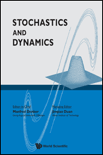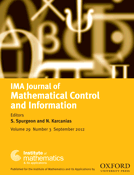
Dynamic Games and Applications
Scope & Guideline
Transforming Ideas into Dynamic Applications
Introduction
Aims and Scopes
- Dynamic Game Theory Development:
The journal emphasizes the development of dynamic game theory, including both deterministic and stochastic frameworks, to analyze interactions among rational decision-makers over time. - Application to Social and Economic Systems:
Research often applies game-theoretic models to social, economic, and environmental issues, highlighting the journal's commitment to addressing real-world challenges through mathematical rigor. - Multi-agent Systems and Cooperative Games:
A significant focus is on multi-agent systems, exploring cooperative and non-cooperative strategies, which contribute to understanding complex interactions in various fields such as economics, ecology, and network theory. - Epidemic Modeling and Public Health:
The journal has carved a niche in applying dynamic games to epidemic modeling and public health, examining how strategic interactions impact disease spread and control measures. - Robustness and Learning in Games:
Research in this area explores how players adapt their strategies in dynamic environments, focusing on learning mechanisms and robustness of game-theoretic solutions.
Trending and Emerging
- Mean Field Games:
The study of mean field games has gained traction, focusing on large populations of players and their collective behaviors, which is crucial for understanding phenomena in economics and social sciences. - Epidemic Control Strategies:
Research exploring game-theoretic approaches to epidemic control, particularly during and after the COVID-19 pandemic, has surged, emphasizing the relevance of strategic decision-making in public health. - Dynamic Resource Management:
There is an increasing interest in dynamic resource management games, which address sustainability and optimal resource allocation in various contexts, including environmental economics and ecological systems. - Stochastic and Robust Game Models:
The emergence of stochastic and robust game models highlights the need for solutions that account for uncertainty and variability in player behaviors and environmental conditions. - Networked Game Dynamics:
The analysis of games on networks, including social and communication networks, is becoming more prevalent, reflecting the complexities of interactions in interconnected systems.
Declining or Waning
- Static Game Models:
There has been a noticeable decrease in the publication of static game models, reflecting a shift towards more dynamic and time-dependent analyses that better capture the complexity of real-world interactions. - Single-agent Decision Making:
Research centered on single-agent decision-making frameworks has become less prominent, as the journal's emphasis has shifted towards multi-agent interactions and cooperative dynamics. - Basic Nash Equilibrium Concepts:
While foundational concepts of Nash equilibria are still relevant, there is a decreasing trend in papers solely focused on basic Nash equilibrium analyses without the integration of dynamic or evolutionary aspects.
Similar Journals

Stochastics and Dynamics
Fostering collaboration through cutting-edge research.Stochastics and Dynamics is a premier journal published by World Scientific Publishing Co Pte Ltd, dedicated to advancing the field of Modeling and Simulation in the realm of applied mathematics. With an ISSN of 0219-4937 and an E-ISSN of 1793-6799, this journal has established itself as a vital resource for researchers and professionals seeking to explore the intricate relationship between stochastic processes and dynamic systems. Ranking in the Q2 category for 2023 within the field and positioned at rank #237 out of 324 mathematics journals according to Scopus, Stochastics and Dynamics provides high-quality, peer-reviewed articles that emphasize innovative methodologies and applications. Since its inception in 2005, the journal continues to publish pioneering research that contributes to the understanding and development of stochastic models and their dynamic behaviors, fostering knowledge that is crucial for both theoretical exploration and practical implementation. Researchers, students, and professionals will find invaluable insights and a collaborative platform within its pages, making it an essential addition to the academic community.

Trudy Instituta Matematiki i Mekhaniki UrO RAN
Elevating Knowledge in Applied Mathematics and Emerging TechnologiesTrudy Instituta Matematiki i Mekhaniki UrO RAN, a prestigious journal published by the KRASOVSKII INST MATHEMATICS & MECHANICS URAL BRANCH RUSSIAN ACAD SCIENCES, serves as a vital platform for the dissemination of research in the diverse fields of applied mathematics, computational mechanics, and computer science applications. With a dedicated focus on advancing theoretical and practical applications within these disciplines, the journal emphasizes innovative methodologies and novel concepts that are crucial in an era where mathematical techniques are increasingly intertwined with emerging technologies. Although currently not an open-access publication, the journal caters to a niche yet expansive audience of researchers, academics, and professionals, providing insights into current trends and breakthroughs. Notably, it holds a commendable position in various quartiles — Q3 in Applied Mathematics and Q2 in Computational Mechanics as of 2023, reflecting its growing influence within the scientific community. While its Scopus rankings indicate a competitive landscape, this journal continues to be a significant resource for scholarly discourse, making substantial contributions to the body of knowledge for its readers based in the Russian Federation and beyond.

Izvestiya Instituta Matematiki i Informatiki-Udmurtskogo Gosudarstvennogo Universiteta
Pioneering Research in Mathematics and Computer ScienceIzvestiya Instituta Matematiki i Informatiki-Udmurtskogo Gosudarstvennogo Universiteta is a distinguished academic journal published by Udmurt State University, located in the Russian Federation. Focusing on the fields of mathematics and computer science, particularly in Computational Theory and Mathematics, the journal is a vital platform for researchers and professionals to disseminate innovative findings and theoretical advancements. With an ISSN of 2226-3594 and an E-ISSN of 2410-1737, it holds a Q3 categorization in both Computational Theory and Mathematics and Mathematics (miscellaneous) for the year 2023, signifying its role in contributing to scholarly discourse. The journal has been operational since 2019, with a commitment to enhance understanding in its domain through the publication of original research articles, reviews, and technical notes. Although not currently open access, its content is crucial for those engaged in mathematical and computational sciences, providing insights that can impact both theoretical and practical applications. Researchers, professionals, and students alike will find valuable resources within its pages as they navigate the complexities of contemporary mathematical challenges and computational methodologies.

SIAM JOURNAL ON CONTROL AND OPTIMIZATION
Unleashing Potential Through Rigorous Theoretical InsightsSIAM Journal on Control and Optimization, published by SIAM Publications, is a premier academic journal dedicated to advancing the study and application of control theory and optimization techniques. Since its inception in 1969, this journal has provided a platform for groundbreaking research within the fields of applied mathematics, control systems, and optimization methodologies, ranking in the top quartile (Q1) in both disciplines as of 2023. With an impressive Scopus ranking of #139 in Applied Mathematics and #34 in Control and Optimization, it attracts high-quality submissions and reaches a broad audience of researchers, professionals, and students. The journal offers a mix of theoretical and practical insights, making it an essential resource for anyone looking to stay abreast of the latest developments in these rapidly evolving fields. With no open access option currently available, the journal ensures that the rigor and depth of its content are made available to educational institutions and organizations committed to academic excellence.

Mathematics and Financial Economics
Pioneering Research in Quantitative Finance and EconomicsMathematics and Financial Economics, published by Springer Heidelberg, is a leading peer-reviewed journal that explores the intersections of mathematical theories and financial practices. With an ISSN of 1862-9679 and an E-ISSN of 1862-9660, the journal has made notable contributions to its field since its inception in 2007, with a convergence period extending until 2024. Positioned in the prestigious Q2 category for both Finance and Statistics and Probability, the journal is ranked within the top 66th percentile in Mathematics and Statistics and the 62nd percentile in Decision Sciences according to Scopus metrics. Researchers and professionals looking for high-quality, innovative research in mathematical finance will find valuable insights within its pages. Although primarily a subscription-based journal, it aims to foster knowledge sharing among academia and industry experts. Its commitment to advancing quantitative methods and financial applications solidifies its importance as a resource for students, researchers, and practitioners dedicated to understanding and navigating the complex dynamics of financial markets.

Journal of Gaming and Virtual Worlds
Exploring the Frontiers of Digital Play.The Journal of Gaming and Virtual Worlds, published by INTELLECT LTD, serves as a pivotal platform for the exploration and dissemination of research in the rapidly evolving fields of gaming, virtual reality, and digital interactions. With an ISSN of 1757-191X and an E-ISSN of 1757-1928, this journal has established itself as a significant contributor to the landscape of computer graphics, computer science applications, and human-computer interaction within the UK and beyond. Operating from Bristol, England, the journal covers a spectrum of interdisciplinary topics that appeal to researchers, practitioners, and students alike, facilitating an enriched understanding of virtual technological advancements. The journal currently holds a Q3 ranking in both Computer Graphics and Computer-Aided Design and Computer Science Applications, as well as a Q4 ranking in Human-Computer Interaction, reflecting its commitment to high-quality scholarship. As it continues to publish pioneering research up to the year 2024, the Journal of Gaming and Virtual Worlds remains a valuable resource for those looking to stay at the forefront of the gaming and virtual environments domain.

OPERATIONS RESEARCH LETTERS
Exploring New Horizons in Operations ResearchOperations Research Letters, published by Elsevier, is a premier journal dedicated to fostering the development and dissemination of innovative research within the field of operations research. With an ISSN of 0167-6377 and an E-ISSN of 1872-7468, this journal has been a vital resource since its inception in 1981, and it continues to publish cutting-edge research through 2024. Positioned in the category quartiles Q2 and Q3 across relevant disciplines—including Applied Mathematics, Industrial and Manufacturing Engineering, Management Science and Operations Research, and Software—this journal provides a crucial platform for scholars and practitioners to explore theoretical advancements and practical applications. The journal is particularly significant for those engaged in the inter-disciplinary challenges of optimizing complex systems, highlighting its importance in driving forward both academic inquiry and industry practice. Researchers, professionals, and students can benefit from the insights presented in its pages, contributing to informed decision-making and strategic innovations in operations research.

AUTOMATION AND REMOTE CONTROL
Leading the Way in Control Systems ResearchAUTOMATION AND REMOTE CONTROL, published by MAIK Nauka/Interperiodica/Springer, is a distinguished international journal renowned for its contribution to the fields of Control and Systems Engineering and Electrical and Electronic Engineering. With an ISSN of 0005-1179 and an E-ISSN of 1608-3032, this journal has been pivotal since its inception in 1973, offering valuable insights and innovative research findings that span the spectrum of automation technologies and control systems. While categorized in the Q3 quartile in both relevant engineering categories as of 2023, it holds a significant position for researchers aiming to disseminate and access quality research in these areas. The journal emphasizes the importance of integrating advanced automation methods and control strategies, fostering the exchange of knowledge among academics, industry professionals, and students alike. Although it does not provide open access options, the compelling research presented within its pages continues to influence the ongoing development of automation systems worldwide.

IMA JOURNAL OF MATHEMATICAL CONTROL AND INFORMATION
Advancing the Frontiers of Mathematical Control and Information.IMA Journal of Mathematical Control and Information, published by Oxford University Press, is a prestigious journal dedicated to advancing the fields of mathematical control, optimization, and information theory. Since its inception in 1984, it has been a vital resource for researchers and professionals, providing a platform for high-quality scholarly articles that explore innovative methodologies and theoretical advancements. With an impressive Q2 ranking in categories such as Applied Mathematics and Control Systems Engineering, the journal is recognized for its rigorous peer-review process and significant contributions to mathematics and engineering. While it does not currently offer Open Access options, its impact is reflected in its notable Scopus rankings, including a rank of #47 in Control and Optimization. As it continues to converge into 2024, the IMA Journal remains a cornerstone for academics and practitioners seeking to deepen their understanding and application of mathematical concepts in control and information systems.

ICGA JOURNAL
Elevating research in graphics, interaction, and mechanics.Welcome to the ICGA Journal, an esteemed publication by IOS Press, dedicated to advancing the field of computational and algorithmic research within computer science. Established with the ambition of fostering innovative dialogue among researchers, this journal focuses on diverse areas such as computer graphics, human-computer interaction, and computational mechanics. Despite undergoing some changes over the years, including its coverage discontinuation in Scopus, the ICGA Journal remains a pivotal resource for professionals and students alike, offering insights into cutting-edge research and methodologies. With a rich history spanning from 2005 to 2015 and in 2017, it continues to be a platform for scholarly exchange, striving to elevate the discourse in the field. Explore the journal's vision through its open access options that promote knowledge dissemination and accessibility among the global research community.